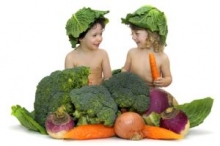A Healthy diet for a pregnant woman
Adequately formulated pregnancy diet will ensure a proper development of your child and optimum conditions for its proper nutrition. It can also prevent developmental defects or diseases, eliminate risks that can cause premature birth or miscarriage, and improve your well-being and appearance.
Pregnant women should therefore pay particular attention to the quality of meals, to contain:
• Whole grains,
• Milk, yogurt, eggs, and dairy products (of course, if you’re not allergic)
• Poultry and sea fishes,
• Legumes,
• Vegetables and fruits,
• Vegetable oils.
You should try to avoid sweets, animal fats, alcohol and caffeine.
” The Morning sickness “
The name of this ailment is rather misleading because only some of women experience nausea and vomiting in the morning. In the vast majority of women “the morning sickness” extends to the whole day and intensifies in the evening. Otherwise this ailment takes a form of a very strong sensitivity to all odors (of spices , cosmetics, food , ” smell ” of public transport ), which causes nausea and aversion to food. What can I say … nausea can ruin the joy of the most awaited pregnancy. Moreover, it can lead to significant loss of weight in the early months of pregnancy. But do not worry - it will be compensated in next trimesters ![]() .
.
• One of theories about the causes of ” morning sickness ” in pregnancy, associates them with a low blood sugar (hypoglycemia) . In this case, it is recommend a diet rich in vegetable protein , vegetables, fruits and grains.
• Practical advice may be eating small portions of food rich in protein, carbohydrates and natural fats, and in particular start your day with a really small meal.
• Factor that contributes the occurrence of ” morning sickness ” may also be associated with an improperly adrenals function and low blood pressure. It often becomes helpful to supplement your diet with vitamin C, vitamin of B group, magnesium and use cod liver oil or flaxseed oil .
• You can also support your health by adding natural ginger to foods and beverages.
Vitamins and minerals in pregnancy
There is no substitute for adequate and healthy eating during pregnancy, but sometimes you will need to supplement nutritional deficiencies with supplements intended for pregnant women, that contain:
• Folic acid,
• Vitamin B12 and B6,
• Iron,
• Magnesium,
• Calcium,
• Zinc,
• Vitamin C and E,
• Flaxseed oil or fish oil (DHA)
The body weight gain during pregnancy
Not so long ago it was believed that a pregnant woman should eat “for two”. Today pregnant women are physically fit and closely adhering to the principles of healthy nutrition. Let’s find out how much is the proper body weight gain for a pregnant woman!
The daily demand for the energy in the first half of pregnancy increases slightly by 300 kcal, and 500 kcal in the second half of pregnancy. The proper weight gain during pregnancy also depends on BMI Index (Body Mass Index = weight [kg]: height [m]) - the lower the ratio, the higher the weight gain should be.
• At low BMI, below 19.8, you should reach 12.5-18 kg weight gain,
• If you have a normal BMI, within 19,8-26, you should reach 11,5-16 kg weight gain,
• At high BMI values 26-29, you need to limit your pregnancy weight gain to 7-11,5 kg,
• At a very high BMI, over 29, your weight gain should not exceed 6 kg.
In pregnancy be careful with:
• High consumption of vitamin A can be harmful to a developing fetus, especially in the first trimester of pregnancy – it can cause cardiovascular disease, craniofacial malformations, hydrocephalus or microcephaly, and even can cause miscarriage,
• Iron deficiency and related anemia is not without importance to the health of both: mother and growing baby,
• A deficiency of magnesium and potassium can cause chronic fatigue and weakness, nervousness, occurrence of very strong cramps of calves and feet, and also increases the risk of perinatal complications.
Article based on dietary suggestions from:
„Fertility, Cycles and Nutrition. Self-care for improved cycles and fertility… naturally!“ M.M. Shannon, CCL, Cincinnati, Ohio, 2009.



